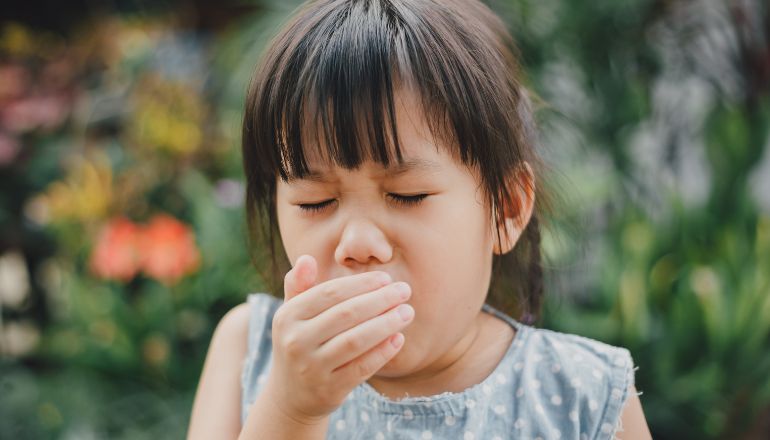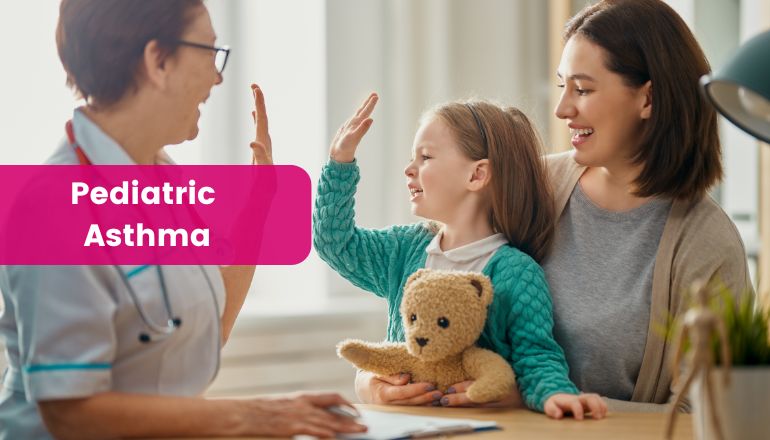Author : Dr.Sihab (Specialist Pediatrician)
Does your child wheeze, cough, or experience difficulty breathing, especially at night or during exercise? These could be signs of pediatric asthma, a chronic respiratory condition affecting millions of children worldwide.

Pediatric asthma is a condition where a child’s airways become irritated, causing wheezing, coughing, and shortness of breath. These symptoms can be triggered by things like dust, pollen, or even cold air.
What is Pediatric Asthma?
Asthma is a condition that causes inflammation and narrowing of the airways in the lungs. This makes it difficult to breathe, leading to symptoms like wheezing, coughing, chest tightness, and shortness of breath. These symptoms can come and go, and often worsen at night or during physical activity.
What Causes Pediatric Asthma?
The exact cause of asthma is unknown, but several factors can contribute to its development, including:
- Genetics: If a parent or close relative has asthma, a child is more likely to develop it.
- Allergies: Children with allergies are more prone to asthma.
- Environmental triggers: Exposure to irritants like smoke, dust mites, or air pollution can trigger asthma symptoms.
- Respiratory infections: Viral respiratory infections can trigger asthma flare-ups.

Symptoms of Pediatric Asthma:
Symptoms of pediatric asthma can vary from child to child, but some common ones include:
- Wheezing: A whistling sound during breathing, especially when exhaling.
- Coughing: Particularly at night or during exercise.
- Chest tightness: A feeling of pressure or tightness in the chest.
- Shortness of breath: Difficulty catching your breath.
- Rapid breathing
Diagnosing Pediatric Asthma:
Diagnosis of pediatric asthma typically involves a combination of factors:
- Medical history: Doctor will discuss your child’s symptoms, family history, and potential triggers.
- Physical examination: The doctor will listen to your child’s lungs for wheezing or other abnormal sounds.
- Lung function tests: These tests measure how well your child’s lungs are working.
Treating Pediatric Asthma:
There is no cure for asthma, but with proper treatment, most children can control their symptoms and lead active lives. Treatment options may include:
- Medications: Inhaled medications are the mainstay of asthma treatment. They help to reduce inflammation and relax the airways, making breathing easier.
- Identifying and avoiding triggers: Doctor can help identify triggers specific to your child and develop a plan to avoid them.
- Action plan: Creating a personalized action plan with Doctor helps you manage asthma flare-ups effectively at home.
Living Well with Pediatric Asthma:
With proper management, most children with asthma can participate fully in all activities they enjoy. Here are some tips for living well with pediatric asthma:
- Follow treatment plan: Regular use of medications as prescribed is crucial for controlling symptoms.
- Learn about triggers: Understanding and avoiding triggers significantly reduces asthma flare-ups.
- Develop an action plan: Knowing what to do during an asthma attack helps manage it effectively.
- Get regular checkups: Scheduled visits with Dr. Panakkathodan allow him to monitor your child’s asthma and adjust treatment as needed.






